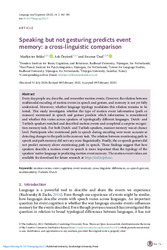Speaking but not gesturing predicts event memory: a cross-linguistic comparison
| dc.contributor.author | Ter Bekke, M. | |
| dc.contributor.author | Özyürek, A. | |
| dc.contributor.author | Ünal, Ercenur | |
| dc.date.accessioned | 2023-06-14T11:00:57Z | |
| dc.date.available | 2023-06-14T11:00:57Z | |
| dc.date.issued | 2022-09 | |
| dc.identifier.issn | 1866-9808 | en_US |
| dc.identifier.uri | http://hdl.handle.net/10679/8402 | |
| dc.identifier.uri | https://www.cambridge.org/core/journals/language-and-cognition/article/speaking-but-not-gesturing-predicts-event-memory-a-crosslinguistic-comparison/96AD4ED390B672F2940C84EFD4ECFFBE | |
| dc.description.abstract | Every day people see, describe, and remember motion events. However, the relation between multimodal encoding of motion events in speech and gesture, and memory is not yet fully understood. Moreover, whether language typology modulates this relation remains to be tested. This study investigates whether the type of motion event information (path or manner) mentioned in speech and gesture predicts which information is remembered and whether this varies across speakers of typologically different languages. Dutch- and Turkish-speakers watched and described motion events and completed a surprise recognition memory task. For both Dutch- and Turkish-speakers, manner memory was at chance level. Participants who mentioned path in speech during encoding were more accurate at detecting changes to the path in the memory task. The relation between mentioning path in speech and path memory did not vary cross-linguistically. Finally, the co-speech gesture did not predict memory above mentioning path in speech. These findings suggest that how speakers describe a motion event in speech is more important than the typology of the speakers' native language in predicting motion event memory. The motion event videos are available for download for future research at https://osf.io/p8cas/. | en_US |
| dc.description.sponsorship | Nederlandse Organisatie voor Wetenschappelijk Onderzoek | |
| dc.language.iso | eng | en_US |
| dc.publisher | Cambridge University Press | en_US |
| dc.relation.ispartof | Language and Cognition | |
| dc.rights | openAccess | |
| dc.rights.uri | https://creativecommons.org/licenses/by/4.0/ | |
| dc.title | Speaking but not gesturing predicts event memory: a cross-linguistic comparison | en_US |
| dc.type | Article | en_US |
| dc.description.version | Publisher version | |
| dc.peerreviewed | yes | en_US |
| dc.publicationstatus | Published | en_US |
| dc.contributor.department | Özyeğin University | |
| dc.contributor.authorID | (ORCID 0000-0002-6794-2129 & YÖK ID 301136) Ünal, Ercenur | |
| dc.contributor.ozuauthor | Ünal, Ercenur | |
| dc.identifier.volume | 14 | en_US |
| dc.identifier.issue | 3 | en_US |
| dc.identifier.startpage | 362 | en_US |
| dc.identifier.endpage | 384 | en_US |
| dc.identifier.wos | WOS:000804999500001 | |
| dc.identifier.doi | 10.1017/langcog.2022.3 | en_US |
| dc.subject.keywords | Co-speech gesture | en_US |
| dc.subject.keywords | Cross-linguistic differences | en_US |
| dc.subject.keywords | Dutch | en_US |
| dc.subject.keywords | Event cognition | en_US |
| dc.subject.keywords | Event memory | en_US |
| dc.subject.keywords | Motion events | en_US |
| dc.subject.keywords | Multimodality | en_US |
| dc.subject.keywords | Turkish | en_US |
| dc.identifier.scopus | SCOPUS:2-s2.0-85130589391 | |
| dc.relation.publicationcategory | Article - International Refereed Journal - Institutional Academic Staff |
Files in this item
This item appears in the following Collection(s)
Share this page




